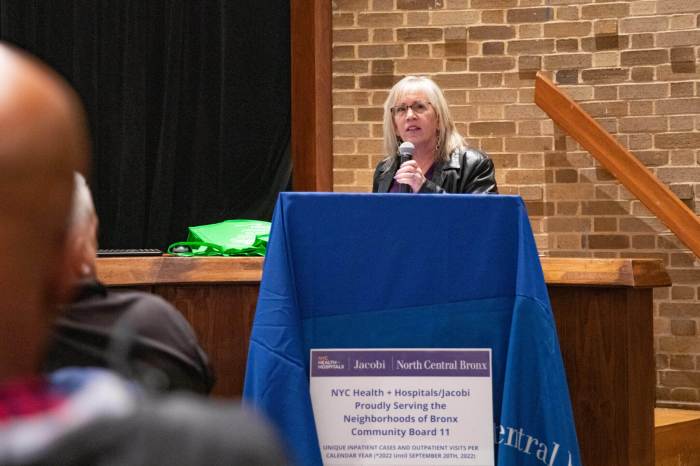History teaches us that all struggles for civil rights are long and include both disappointments and victories. Indeed, this has been the history of civil rights for the LGBT community—progress has been slow, but steady. The Court of Appeals’ poorly-reasoned, homophobic decision regarding marriage of same-sex couples is indeed a setback, but instead of depressing us, it must mobilize us, making us stronger and even more determined than before to continue our march toward equality.
Although we knew it would be a challenge to win marriage rights for same-sex couples in a court comprised largely of Governor George Pataki’s hand-picked judges, we were shocked at the insulting tone and erroneous assumptions that lay at the core of the lead plurality opinion. In fact, the decision completely failed to explore or comment on the lives and realities of the plaintiff couples and the real-life consequences of their exclusion from marriage. The plurality also failed to account for the best interests of the children of these and other same-sex couples, instead inferring—based solely on “intuition” and against all credible evidence—that children must be raised by a man and a woman.
Furthermore, the plurality’s repeated reference to “sexual preference” rather than sexual orientation is appalling. For years, the state Legislature has passed measures, such as the Sexual Orientation Non-Discrimination Act, that signal its appreciation and understanding that homosexuality is not a choice. While the plurality stated that it would defer to the Legislature regarding marriage of same-sex couples, it then went on take a far different approach than the Legislature by deliberately utilizing a term that indicates that sexual orientation is a choice. In doing so, the plurality has shown not only its failure to understand homosexuality as an immutable characteristic, but also its ignorance and hostility toward our community.
Unfortunately, these views resulted in a decision that may very well have negative ramifications in areas beyond marriage equality. For example, the plurality’s statement that “intuition and experience suggest that a child benefits from having, before his or her eyes, everyday, living models of what both a man and a woman are like,” may threaten the security of the many thousands of same-sex families with children in this state. The concurring opinion, in suggesting that the protections of the state Constitution are no broader than those of the federal Constitution, jeopardizes important principles of New York law concerning free speech, freedom of the press, and other civil liberties. It is clear that while we must advocate on the issue of marriage equality, we must also be mindful to protect other civil rights that may now be at stake.
Homophobia, like racism, is a pernicious evil that is often based in fear and lack of understanding—each of which was evident in the court’s decision. Despite their similarities, the court differentiated interracial marriage from same-sex marriage by stating that racism has long been recognized as wrong. It is ridiculous to insist that a practice is not evil simply because society has only recently understood it as wrong. Homophobia and discrimination based on sexual orientation are wrong today, were wrong ten years ago, and will be wrong the day the Legislature removes the bar to marriage for same-sex couples.
To reach that inevitable day, the community and our allies have much work to do in securing passage of legislation permitting marriage of same-sex couples. We are hopeful that Eliot Spitzer will indeed be elected governor and that he will put forth a program bill providing for marriage equality, thereby significantly increasing the chances that this measure will be passed by the Legislature. We will also continue to impress upon our colleagues the importance of marriage for same-sex couples and the need to publicly support this basic civil right.
However, state senators and assemblymembers from all corners of the state must feel pressure from a much broader constituency during the next six months so that every legislator who is elected this year feels that there is a significant base of support among their constituents for marriage equality and arrives in Albany next January already committed to supporting our right to marry.
To do this, we must mobilize quickly to build a statewide base of support for marriage equality. Legislators statewide must hear from their constituents—both gay and straight—on this issue. We must reach out to our straight allies and encourage them to contact their legislators to urge their support of equal marriage rights. We must ensure that, in supporting candidates for office, individuals make clear that they support equal marriage rights. We must write to our local papers in support of same-sex marriage and encourage our allies to do so. To be sure, we have a lot of work to do.
Though we are still reeling from the harshness of the Court of Appeals decision, we must remember that this decision is a disappointment—not a defeat. We have no doubt that the New York State Legislature will one day in the not-so-distant future provide equal marriage rights for all couples. Until that day, we must continue our march toward equality with clearer purpose and renewed passion.
Deborah J. Glick is the state assemblywoman from Lower Manhattan’s 66th District and Daniel O’Donnell is the state assemblyman from the 69th District on the Upper West Side of Manhattan.
gaycitynews.com

































